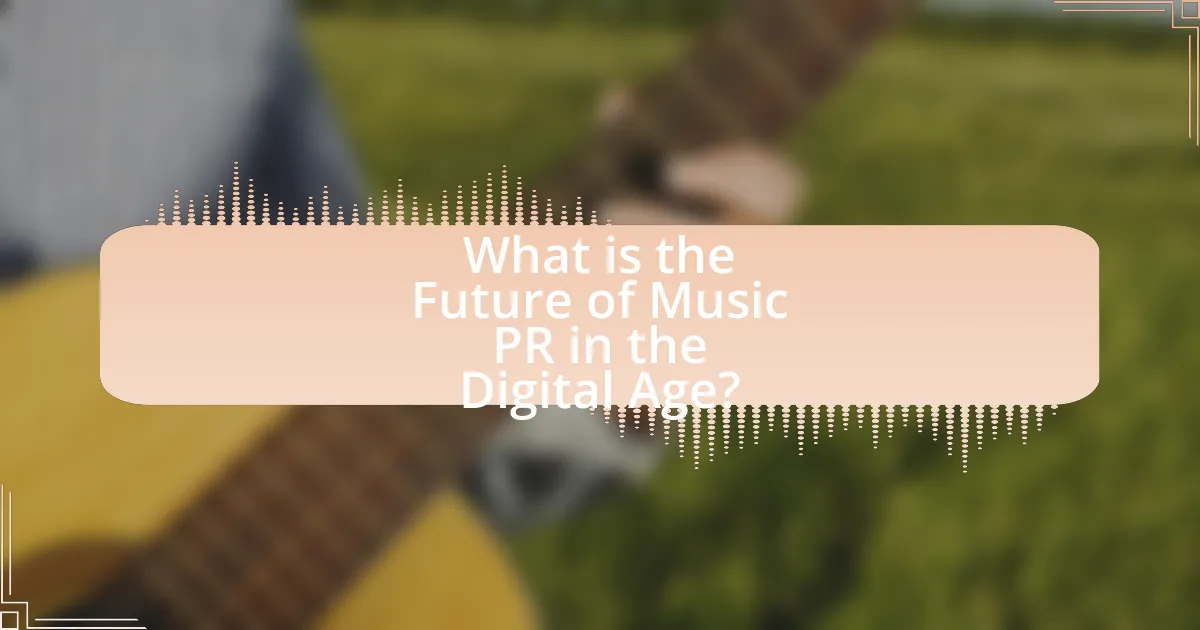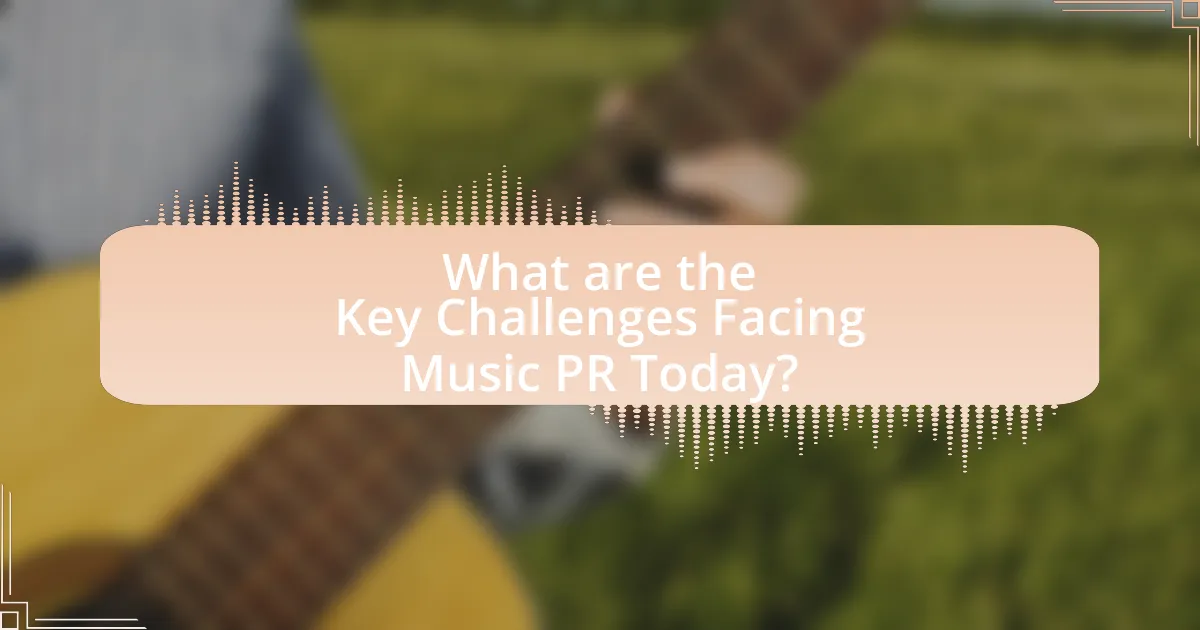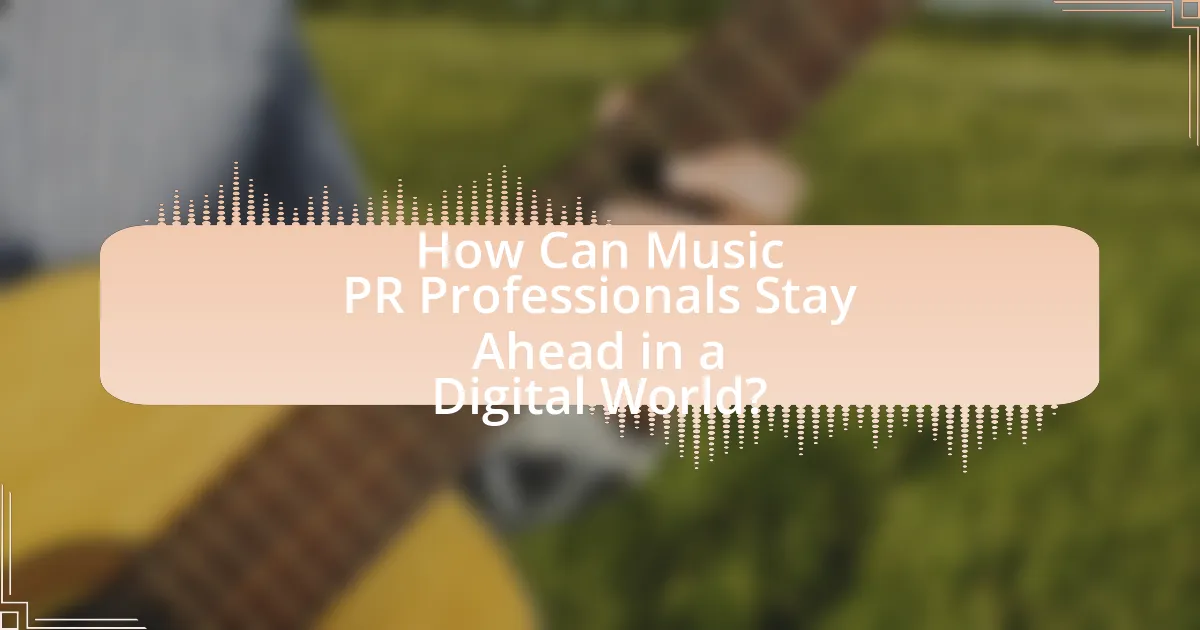The article focuses on the future of music public relations (PR) in the digital age, emphasizing the importance of data-driven strategies and social media engagement. It outlines how digital trends, such as the rise of streaming services and influencer marketing, are reshaping PR strategies by enhancing direct artist-audience interactions and enabling targeted outreach through analytics. Key challenges facing music PR today include platform saturation and the need for authentic engagement, while technologies like artificial intelligence and social media analytics are transforming the landscape. The article also highlights essential skills for modern PR practitioners and best practices for effective digital campaigns, underscoring the necessity of adapting to evolving consumer behaviors and technological advancements.

What is the Future of Music PR in the Digital Age?
The future of music PR in the digital age will increasingly rely on data-driven strategies and social media engagement. As digital platforms continue to dominate music consumption, PR professionals will utilize analytics to tailor campaigns that resonate with specific audiences. For instance, a report by the International Federation of the Phonographic Industry (IFPI) indicates that 70% of music listeners discover new music through streaming services and social media, highlighting the importance of these channels in PR strategies. Additionally, the rise of influencer marketing will further shape music PR, as artists collaborate with social media influencers to reach wider audiences. This shift towards digital engagement and analytics-driven approaches will define the future landscape of music PR.
How are digital trends reshaping music public relations?
Digital trends are reshaping music public relations by enhancing direct engagement between artists and their audiences through social media platforms. These platforms allow musicians to communicate in real-time, share content, and build personal connections, which traditional PR methods could not achieve as effectively. For instance, a 2021 report by the International Federation of the Phonographic Industry indicated that 70% of music consumers engage with artists on social media, highlighting the shift towards digital interaction. Additionally, data analytics tools enable PR professionals to track audience preferences and tailor campaigns accordingly, leading to more targeted and effective outreach strategies. This evolution reflects a broader trend where immediacy and personalization are prioritized in music PR efforts.
What specific digital trends are influencing music PR strategies?
Specific digital trends influencing music PR strategies include the rise of social media platforms, data analytics, and influencer marketing. Social media platforms like Instagram and TikTok have become essential for artists to engage with fans and promote their music, as evidenced by the fact that 67% of music consumers discover new music through social media. Data analytics allows PR professionals to tailor campaigns based on audience insights, improving targeting and engagement. Additionally, influencer marketing leverages the reach of popular figures to amplify music releases, with 49% of marketers stating that influencer partnerships are effective for brand awareness in the music industry. These trends collectively shape how music PR strategies are developed and executed.
How do these trends affect artist visibility and engagement?
Digital trends significantly enhance artist visibility and engagement by leveraging social media platforms and streaming services. These platforms allow artists to reach wider audiences instantly, with statistics showing that 70% of music discovery now occurs on platforms like Spotify and YouTube. Additionally, the use of data analytics enables artists to understand their audience better, tailoring their content to increase interaction. For instance, artists who actively engage with fans on social media report a 30% increase in fan loyalty and engagement metrics. Thus, adapting to these digital trends is crucial for artists to maintain relevance and foster deeper connections with their audience.
Why is adapting to technology crucial for music PR professionals?
Adapting to technology is crucial for music PR professionals because it enables them to effectively reach and engage audiences in an increasingly digital landscape. The rise of social media platforms, streaming services, and data analytics has transformed how music is promoted and consumed, making it essential for PR professionals to leverage these tools for successful campaigns. For instance, according to a report by the International Federation of the Phonographic Industry, over 70% of music consumption now occurs through digital channels, highlighting the need for PR strategies that incorporate online engagement and targeted outreach.
What technologies are currently transforming the music PR landscape?
Artificial intelligence, social media analytics, and blockchain technology are currently transforming the music PR landscape. Artificial intelligence enhances audience targeting and content personalization, allowing PR professionals to tailor campaigns more effectively. Social media analytics provide real-time insights into audience engagement and sentiment, enabling data-driven decision-making for promotional strategies. Blockchain technology offers transparency in royalty distribution and copyright management, fostering trust between artists and stakeholders. These technologies collectively streamline processes, improve communication, and enhance the overall effectiveness of music PR efforts.
How can music PR professionals leverage these technologies effectively?
Music PR professionals can effectively leverage technologies by utilizing data analytics to target audiences and optimize campaigns. By analyzing streaming data, social media engagement, and audience demographics, PR professionals can tailor their messaging and outreach strategies to resonate with specific listener segments. For instance, platforms like Spotify and Apple Music provide insights into listener behavior, allowing PR teams to identify trends and preferences. This targeted approach increases the likelihood of successful campaigns, as evidenced by a 2022 report from the Music Industry Association, which found that data-driven campaigns resulted in a 30% increase in audience engagement compared to traditional methods.

What are the Key Challenges Facing Music PR Today?
The key challenges facing music PR today include the saturation of digital platforms, the rapid evolution of social media algorithms, and the need for authentic engagement with audiences. The music industry has become increasingly crowded, making it difficult for artists to stand out amidst a plethora of content. Additionally, social media platforms frequently change their algorithms, which can hinder the visibility of promotional content. Furthermore, audiences now demand genuine interactions rather than traditional marketing tactics, necessitating a shift in PR strategies to foster real connections. These challenges require music PR professionals to continuously adapt and innovate to effectively promote their clients in a dynamic landscape.
How do changing consumer behaviors impact music PR strategies?
Changing consumer behaviors significantly impact music PR strategies by necessitating a shift towards digital engagement and personalized marketing. As consumers increasingly rely on streaming services and social media for music discovery, PR strategies must adapt to leverage these platforms effectively. For instance, a 2021 report by the International Federation of the Phonographic Industry (IFPI) indicated that 70% of music listeners discover new music through streaming platforms, highlighting the need for PR campaigns to focus on digital presence and influencer partnerships. Additionally, the rise of user-generated content has led PR strategies to incorporate fan engagement initiatives, such as interactive social media campaigns, to foster community and loyalty among listeners.
What role does social media play in shaping these behaviors?
Social media significantly influences behaviors in the music industry by facilitating direct engagement between artists and their audiences. This platform allows musicians to share content, promote their work, and interact with fans in real-time, which fosters a sense of community and loyalty. According to a 2021 report by the International Federation of the Phonographic Industry, 75% of music consumers discover new music through social media platforms, highlighting their critical role in shaping listening habits and preferences. Additionally, social media algorithms prioritize content that generates engagement, further amplifying the visibility of certain artists and trends, thus directly impacting consumer behavior and industry dynamics.
How can PR professionals adapt to these shifts in consumer preferences?
PR professionals can adapt to shifts in consumer preferences by leveraging data analytics to understand audience behavior and preferences. By utilizing tools that analyze social media trends, engagement metrics, and consumer feedback, PR professionals can tailor their strategies to align with the evolving interests of their target demographics. For instance, a study by Nielsen indicates that 66% of consumers are more likely to engage with brands that personalize their communication, highlighting the importance of data-driven insights in shaping effective PR campaigns.
What are the implications of data analytics in music PR?
Data analytics significantly enhances music PR by enabling targeted marketing strategies and audience engagement. By analyzing listener data, PR professionals can identify trends, preferences, and demographics, allowing for more effective campaign planning. For instance, platforms like Spotify and Apple Music provide insights into listener behavior, which can inform promotional efforts and optimize release strategies. According to a report by Nielsen Music, data-driven decisions can lead to a 20% increase in campaign effectiveness, demonstrating the tangible benefits of leveraging analytics in music public relations.
How can data analytics enhance targeting and outreach efforts?
Data analytics enhances targeting and outreach efforts by enabling organizations to identify and segment their audience more effectively. By analyzing data from various sources, such as social media interactions, streaming statistics, and demographic information, organizations can create detailed profiles of their target audience. This allows for personalized marketing strategies that resonate with specific groups, increasing engagement rates. For instance, a study by McKinsey & Company found that companies using advanced analytics for customer segmentation can achieve up to 10% higher revenue growth compared to those that do not. Thus, leveraging data analytics leads to more precise targeting and improved outreach effectiveness in the music PR landscape.
What tools are available for music PR professionals to utilize data effectively?
Music PR professionals can utilize tools such as Hootsuite, BuzzSumo, and Chartmetric to effectively manage and analyze data. Hootsuite allows for social media management and analytics, enabling PR professionals to track engagement metrics across platforms. BuzzSumo provides insights into content performance and audience engagement, helping professionals identify trending topics and influencers. Chartmetric offers data analytics specifically for the music industry, allowing PR teams to monitor streaming statistics, social media metrics, and audience demographics. These tools collectively enhance the ability to make data-driven decisions in music PR strategies.

How Can Music PR Professionals Stay Ahead in a Digital World?
Music PR professionals can stay ahead in a digital world by leveraging data analytics and social media platforms to enhance their strategies. Utilizing tools like Google Analytics and social media insights allows professionals to track audience engagement and preferences, enabling targeted campaigns. According to a report by the International Music Summit, 70% of music consumers engage with artists through social media, highlighting the importance of a strong online presence. Additionally, staying informed about emerging technologies, such as AI-driven marketing tools, can help PR professionals create more personalized and effective outreach efforts.
What skills are essential for modern music PR practitioners?
Essential skills for modern music PR practitioners include strong communication abilities, digital marketing expertise, and social media proficiency. Communication skills are crucial for crafting compelling narratives and engaging with various stakeholders, including artists, media, and fans. Digital marketing expertise allows practitioners to effectively promote music through online channels, utilizing SEO and analytics to measure success. Social media proficiency is vital for building and maintaining an artist’s online presence, as platforms like Instagram and Twitter are key for fan engagement and promotion. These skills are supported by the increasing reliance on digital platforms in the music industry, where over 70% of music consumption occurs online, highlighting the need for PR professionals to adapt to these trends.
How can professionals develop these skills in a rapidly changing environment?
Professionals can develop skills in a rapidly changing environment by engaging in continuous learning and adapting to new technologies. This involves participating in online courses, attending workshops, and leveraging digital platforms to stay updated on industry trends. For instance, a study by the World Economic Forum highlights that 94% of business leaders expect employees to pick up new skills on the job, emphasizing the importance of lifelong learning in adapting to change. Additionally, networking with industry peers and joining professional organizations can provide insights and resources that facilitate skill development in response to evolving digital landscapes.
What resources are available for ongoing education in music PR?
Resources available for ongoing education in music PR include online courses, industry webinars, and professional organizations. Platforms like Coursera and Udemy offer courses specifically focused on music marketing and public relations, while organizations such as the Music Business Association provide webinars and networking opportunities. Additionally, subscribing to industry publications like Billboard and Music Week can keep professionals updated on trends and best practices in music PR. These resources are essential for staying informed and adapting to the evolving landscape of digital trends and technologies in the music industry.
What best practices should be adopted for effective digital music PR?
Effective digital music PR should adopt a multi-channel approach that leverages social media, targeted email campaigns, and influencer partnerships. Utilizing platforms like Instagram, TikTok, and Twitter allows artists to engage directly with fans, while email campaigns can deliver personalized content to specific audience segments. Collaborating with influencers who resonate with the target demographic can amplify reach and credibility. According to a 2021 report by the International Federation of the Phonographic Industry, 70% of music consumers discover new music through social media, highlighting the importance of these platforms in digital PR strategies.
How can storytelling enhance music PR campaigns in the digital space?
Storytelling can enhance music PR campaigns in the digital space by creating emotional connections with audiences, which increases engagement and shareability. When artists share their personal narratives, experiences, or the inspiration behind their music, they foster a deeper relationship with fans. For instance, a study by the University of Southern California found that storytelling can increase audience retention by up to 65%, demonstrating its effectiveness in capturing attention. Additionally, platforms like Instagram and TikTok allow artists to visually narrate their stories, making content more relatable and memorable, which can lead to higher streaming numbers and social media interactions.
What role does collaboration with influencers play in music PR success?
Collaboration with influencers is crucial for music PR success as it amplifies reach and enhances credibility. Influencers possess established audiences that trust their recommendations, allowing artists to tap into new fan bases effectively. For instance, a study by Nielsen found that 92% of consumers trust recommendations from individuals over brands, highlighting the power of influencer endorsements in shaping public perception. Additionally, partnerships with influencers can lead to increased engagement on social media platforms, driving streams and sales. This strategic alignment not only boosts visibility but also fosters authentic connections between artists and listeners, essential in the evolving digital landscape of music PR.
What practical tips can help music PR professionals thrive in the digital age?
Music PR professionals can thrive in the digital age by leveraging social media platforms effectively. Utilizing platforms like Instagram, Twitter, and TikTok allows PR professionals to engage directly with audiences, share content, and promote artists in real-time. According to a 2021 report by Hootsuite, over 4.2 billion people use social media globally, highlighting its importance in reaching potential fans. Additionally, employing data analytics tools can help PR professionals track engagement metrics and adjust strategies accordingly, ensuring campaigns are data-driven and targeted. This approach not only enhances visibility but also fosters a deeper connection between artists and their audiences.